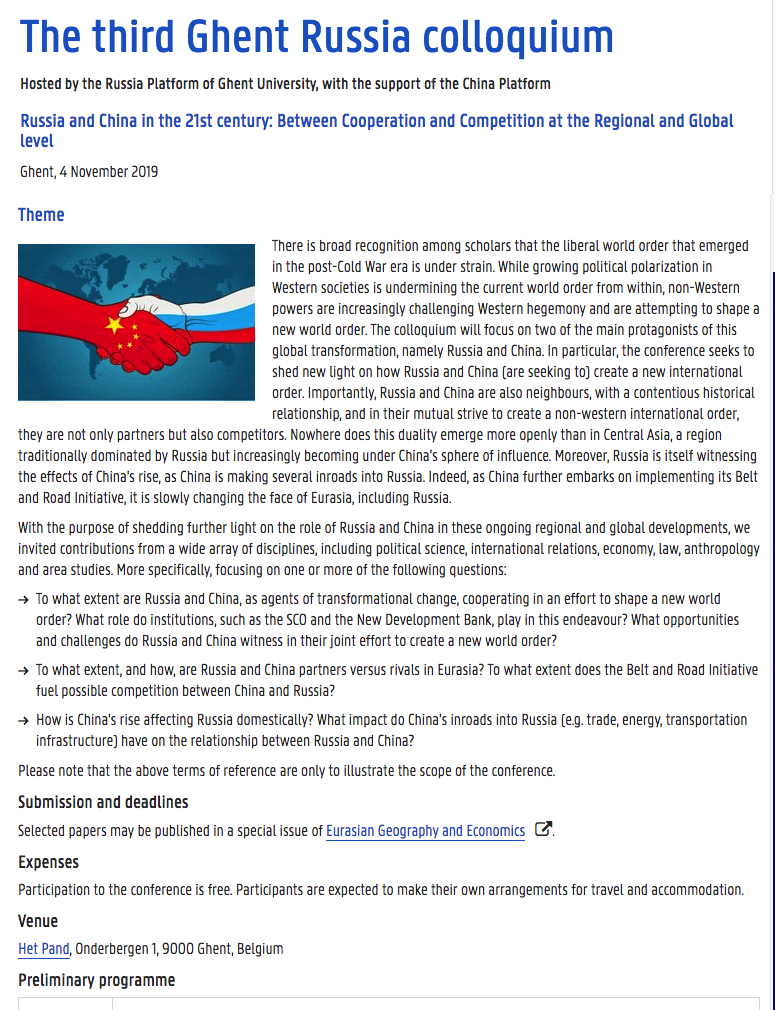| ||||||||||||||
Russia and China in the 21st century : Between Cooperation and Competition at the Regional and Global level.The third Ghent Russia colloquium.Hosted by the Russia Platform of Ghent University, with the support of the China Platform Het Pand, Onderbergen 1, 9000 Gent le lundi 4 novembre 2019 Сайт/Site : https://www.ugent.be/russiaplatform/en/colloquium
There is broad recognition among scholars that the liberal world order that emerged in the post-Cold War era is under strain. While growing political polarization in Western societies is undermining the current world order from within, non-Western powers are increasingly challenging Western hegemony and are attempting to shape a new world order. The colloquium will focus on two of the main protagonists of this global transformation, namely Russia and China. In particular, the conference seeks to shed new light on how Russia and China (are seeking to) create a new international order. Importantly, Russia and China are also neighbours, with a contentious historical relationship, and in their mutual strive to create a non-western international order, they are not only partners but also competitors. Nowhere does this duality emerge more openly than in Central Asia, a region traditionally dominated by Russia but increasingly becoming under China’s sphere of influence. Moreover, Russia is itself witnessing the effects of China’s rise, as China is making several inroads into Russia. Indeed, as China further embarks on implementing its Belt and Road Initiative, it is slowly changing the face of Eurasia, including Russia. With the purpose of shedding further light on the role of Russia and China in these ongoing regional and global developments, we invited contributions from a wide array of disciplines, including political science, international relations, economy, law, anthropology and area studies. More specifically, focusing on one or more of the following questions: To what extent are Russia and China, as agents of transformational change, cooperating in an effort to shape a new world order? What role do institutions, such as the SCO and the New Development Bank, play in this endeavour? What opportunities and challenges do Russia and China witness in their joint effort to create a new world order? To what extent, and how, are Russia and China partners versus rivals in Eurasia? To what extent does the Belt and Road Initiative fuel possible competition between China and Russia? How is China’s rise affecting Russia domestically? What impact do China’s inroads into Russia (e.g. trade, energy, transportation infrastructure) have on the relationship between Russia and China? Please note that the above terms of reference are only to illustrate the scope of the conference. Submission and deadlines Selected papers may be published in a special issue of Eurasian Geography and Economics. Expenses Participation to the conference is free. Participants are expected to make their own arrangements for travel and accommodation. Preliminary programme 09:00 – 9:15 Registration and welcome coffee 09:15 – 11:00 Parallel sessions 1 11:00 – 11:15 Coffee break 11:15 – 13:00 Parallel sessions 2 13:00 – 13:45 Lunch 13:45 – 15:15 Keynote panel with Timofei Bordachev (Higher School of Economics Moscow) and Shaolei Feng (East China Normal University) 15:15 – 17:00 Parallel sessions 3 17:00 - 17:15 Coffee break 17:15 - 19:00 Parallel sessions 4 19:00 - 21:30 Conference dinner Keynote speakers : Timofei Bordachev is Associate Professor at the Faculty of World Economy and International Affairs, Higher School of Economics (Moscow), and Programme Director of the Valdai Discussion Club. Shaolei Feng is Dean of the School of Advanced International and Area Studies (SAIAS) and Director of the Center for Russian Studies at East China Normal University Catégorie : Géopolitique | Type : Colloque Bordereau → notice (réservé) | Inscription | Liens → agenda similaires | livres-souvenirs | Privé | ||||||||||||||
